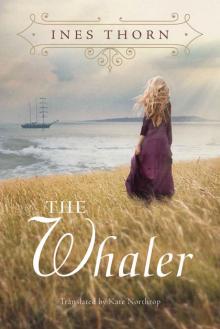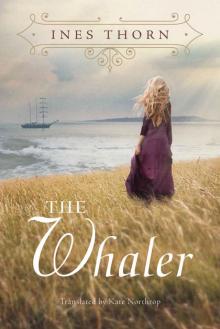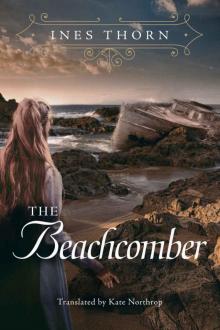- Home
- Ines Thorn
The Whaler (The Island of Sylt Book 1)
The Whaler (The Island of Sylt Book 1) Read online
This is a work of fiction. Names, characters, organizations, places, events, and incidents are either products of the author’s imagination or are used fictitiously. Any resemblance to actual persons, living or dead, or actual events is purely coincidental.
Text copyright © 2016 Ines Thorn
Translation copyright © 2017 Kate Northrop
All rights reserved.
No part of this book may be reproduced, or stored in a retrieval system, or transmitted in any form or by any means, electronic, mechanical, photocopying, recording, or otherwise, without express written permission of the publisher.
Previously published as Die Walfängerin by Aufbau Verlag in Germany in 2016. Translated from German by Kate Northrop. First published in English by AmazonCrossing in 2017.
Published by AmazonCrossing, Seattle
www.apub.com
Amazon, the Amazon logo, and AmazonCrossing are trademarks of Amazon.com, Inc., or its affiliates.
ISBN-13: 9781611099249
ISBN-10: 1611099242
Cover design by PEPE nymi
CONTENTS
The Island of Sylt
PART 1
CHAPTER 1
CHAPTER 2
CHAPTER 3
CHAPTER 4
CHAPTER 5
CHAPTER 6
CHAPTER 7
CHAPTER 8
CHAPTER 9
CHAPTER 10
PART 2
CHAPTER 11
CHAPTER 12
CHAPTER 13
CHAPTER 14
CHAPTER 15
CHAPTER 16
CHAPTER 17
CHAPTER 18
CHAPTER 19
CHAPTER 20
CHAPTER 21
CHAPTER 22
PART 3
CHAPTER 23
CHAPTER 24
CHAPTER 25
CHAPTER 26
CHAPTER 27
CHAPTER 28
CHAPTER 29
CHAPTER 30
CHAPTER 31
CHAPTER 32
ABOUT THE AUTHOR
ABOUT THE TRANSLATOR
PART 1
THE NORTH FRISIAN ISLAND OF SYLT, 1764
CHAPTER 1
On the island of Sylt, there was one god for the summer and another for the winter. The summer god was worshipped in church and referred to as the Almighty. The other, the winter god, was Captain Rune Boyse. On this day, he stood atop the dunes, feet planted wide in heavy leather boots, arms crossed over his chest. He was observing his flock, their backs hunched under their loads, as they rushed over the bright sandy beaches collecting flotsam left by the storm. Boyse was a large man with a thick black beard, brilliant piercing eyes, and hair almost as long as that of the crucified Jesus which hung in the little village church in Rantum. He wore charcoal-gray breeches of tanned deer hide and his sailor’s jacket, but he didn’t look at all like a sailor. He looked like the man who ruled the entire island.
Only the older folks still remembered how Rune Boyse had become the winter god of Sylt. He had gone to sea for the first time when he was young, barely eleven years old when he joined his father and brother-in-law on a whaling ship as a ship’s boy. The ship had become stuck in the ice near Greenland, and almost the entire crew had starved to death. Only Rune Boyse and his brother-in-law managed to escape the icy grave. Rumor had it that the boy had saved his sister’s husband’s life, but it couldn’t be proven, because the man had left for the mainland a year later, after his wife died. Rumor had it, too, that young Boyse had encouraged him to leave. No one on the island knew the details, no one except for one woman. The rest only knew that Boyse’s brother-in-law hadn’t left Sylt of his own free will. But whatever the rumors were, one thing was clear: Rune Boyse held the island tightly in his grip. He wasn’t a governor, but his word had great weight among the people. Even the elders listened to what he had to say. Since he had survived out on the frozen sea, it was said that he was favored by the old gods, and was stronger and cleverer than any other man on the island. He knew what went on in every household, upheld law and order, and was respected by everyone for his sense of justice. He was especially admired among the women. Despite the admiration he received, he chose to remain alone, and no one knew the intimacies of his heart or mind. Not even now, as he reigned over the dunes, watching his flock like the Almighty Father in heaven.
During the night, once again a ship had foundered near the island. It had probably belonged to a Hamburg merchant and been on its way to Norway. The rough sea had captured part of the cargo, countless red winter apples from the old country around Hamburg, and cast them onto the beach. There they lay, red dots on the pale sand, just waiting to be collected. The sky was gray, steel gray like the sea tossing foamy whitecaps onto the beach, the flying spray settling on clothing, hair, and faces. A few seagulls cried as they soared above, through the air scented with salt and seaweed and a hint of the delicious aroma of apples.
The crowd was unusually silent. Everyone was bent over, eyes glued to the sand, desperately trying to grab apples before a neighbor got to them. From the dunes, it looked like a swarm of ants cautiously trying to stay out of each other’s way but still covetous of every single apple. Old Meret—who could speak with the dead, so they said—dragged a half-full sack up the dunes, her face taut with the effort. Two old men carried a heavy crate between them, which they had to put down every few steps. A mother with a baby wrapped tight to her chest had folded her skirt up, revealing her pale legs, to make a basket for the apples. A stray dog shoved one of them back and forth with its nose, and two boys were filling their caps. A small child sat down in the wet sand and tried to bite into an apple, crying loudly when it couldn’t. Entire families had banded together and were picking up whatever they could. Some of them could already imagine the perfume of baked apples.
Even toothless old Wilhelmine, who couldn’t really walk anymore, had been set down on the beach by her daughter-in-law to try her luck. She was sitting there trying to fish out the fruits with a stick. Apples were rare on Sylt, especially in January. A gaunt woman shoved someone aside with her hip, and a little girl squealed as another child darted in front of her.
“There, look! There’s another!” Thies Heinen, one of the few men participating in the hunt, pointed to an apple that was partly hidden by beachgrass. Maren straightened, pushed a strand of hair off her face, and smiled at Thies. As usual, when she looked at him, she felt her heart grow warmer. They had been together for more than a year, and it was common knowledge that they would marry one day. Thies Heinen, the most handsome young man on the island. True, he wasn’t rich, but he was strong and dependable. His chest was broad like the chests of the men who loaded the ships in the harbor, and his blond hair always looked as though he’d just walked in out of a storm. His blue eyes gleamed.
“What are you thinking about?” he asked. “Should I be worried?”
Maren laughed with genuine pleasure. “Isn’t this wonderful?” she said, waving a hand at her willow basket, already more than half-full. “Of course, it doesn’t mean we won’t have to go hungry again before spring, but it’s certainly helpful. Oh, I can already taste the apple cake!”
Most of the residents of Sylt were terribly poor. Many of the men went out in their fishing boats to catch herring, but the herring population had been declining for years, and their nets often came back empty. Others went on whaling ships to Greenland, but even that was uncertain. The earnings were contingent upon how many whales they caught. It often seemed as though the whalers came home with less than when they’d left, because not every ship found whales to hunt. Only the captains and officers of the whaling ships had a g
uaranteed income, receiving payment even if their ships returned empty to the harbor. Many of them could even afford to build solid Frisian houses with reed roofs. Of course, not in the village of Rantum, which was built on the narrowest part of the island and was completely exposed to the whims of the weather, helpless before the forces of nature. Between the North Sea on the west side and the Wadden Sea on the east, the land could be crossed in about a thousand paces. By God, it wasn’t much. And after every storm, there was a little bit less. There were hardly any meadows, no trees, and absolutely no arable land. Only the dunes, covered in beachgrass, creeping willow, crowberry, yellow beach roses, and sea holly. A sheep could barely find enough to eat there, and certainly no cow. Bog heather grew in the valleys between the dunes, and occasionally marsh gentian, which could be brewed into a healthful elixir. Sea buckthorn, which the people of Sylt made into punch, preserves, and juice, grew there too. Otherwise, the landscape was sparse, and not exactly blessed with color. Especially not in January, when the dune plants were all murky shades of gray and brown.
The houses, or rather huts, of Rantum clung to the Wadden Sea side of the dunes, to find at least a little protection from the strong winds. The clotheslines fluttered with shirts, breeches, and skirts, and also, always, fishing nets. Dried sheep dung for heating was piled against the sheltered side of the houses, and in the most protected corners were little plots of kale. The houses were small, just a kitchen with box beds and a living room. Wealthier households had a formal parlor on the wind-sheltered east side. Separated from the living areas by only a breezeway were a work area, a smoke room, and a small stall for the occasional sheep.
The people who lived in Rantum were mostly herring fishers. There was a smithy and a small general store where they could buy whale oil for lamps, soap, flour, and dried beans. In all, the village consisted of these, a little church, and around twenty houses, and not even one of them was half as fine as a real captain’s home.
The captains built in Keitum. There, the island was wide enough to raise sheep on either side in the marshes. Nice fat salt-marsh sheep with soft wool, which was knit into warm things that would keep out the damp and rain because of the salt it had absorbed. Stockings for fishermen and whalers, thick sweaters for winter, lined coats, and blankets that would keep you warm even when the fire had gone out. And most important, there was arable land, largely protected from the sea. Land where they could grow barley, oats, rye, and broad beans. There they had real vegetable gardens, and they planted carrots, cabbages, and turnips, and some even kept a few chickens.
In Rantum, there were just a few narrow strips of land on the Wadden coast, capable of growing only some tough grasses. Even if some courageous soul plowed a field there, planted it, and cared for it, the next storm tide would rise to cover it, and the field would become hopelessly salted.
Only the Wadden Sea offered a small bounty. Young people went out to seek shellfish and seagull eggs, but even those didn’t last all year: seagull eggs become inedible once they were brooded. Some people set snares for sandpipers, oystercatchers, and other seabirds, but birds were seldom caught, and hunger was a constant guest in the homes of Rantum. Hunger was not the only problem on Sylt. There was no firewood, for no trees grew on the island. There was only water, sand, heather, and of course the dunes. Those who could afford it had firewood brought from the mainland, but not many could. Most people began to collect sheep dung in early spring, to dry and burn throughout the winter. You could get used to the smell, but not to the neighbors who thought that because they owned the sheep, they owned the dung too. Fruit was extremely rare and extremely costly. There were no plum trees, quince trees, or apple trees on Sylt.
Thies, who was filling his sack slowly and deliberately, nodded.
“Today we have apples, and tomorrow, if we’re lucky, we’ll get parts of the ship. Good planks, pieces of the masts, decking. Then we’ll have some wood for heating again.”
Maren shuddered. She knew well enough that corpses came along with parts of the ship. And she also knew that the entire population of the village would be on the beach again. They would swarm over the dead, taking their boots, breeches, and skirts. They would empty pockets and hope to find a few coins sewn into the linings of coats. They would pull out earrings, search for sailors’ sea chests, and break them open roughly. They would take Bibles, whale-oil lamps, and tools. And the beach overseer would turn a blind eye and would only come to bury the remains after the citizens of Rantum had left.
Maren hated the body stripping, but of course, she took part in it, like everyone else. How else could one survive on Sylt? She bent down for the apple that was hiding in the beachgrass. Suddenly she was shoved aside.
“Get your paws off it! That one’s mine!”
Maren looked up. Grit Wilms stood in front of her, staring her down with narrowed eyes. Her hair had slid out from under her bonnet and was sticking to her cheeks, which were red with fervor. “I saw that apple first. It’s mine.”
Maren shrugged. “Thies pointed it out to me a while ago. It’s mine. But if you’re desperate for it, take it. There are others.”
Grit Wilms was tall and thin with small, malicious eyes and hair the color of wet sand. She already had careworn lines around her mouth and nose. She gave a little snort. “Ha! Thies! Thies! All you talk about is Thies! If I wanted, he would be collecting the nicest apples for me, and you wouldn’t even see his backside.”
“Oh, really?” Maren smoothed her dress. She did that when she was angry. And she was always angry when she met Grit. Grit, who had been making her life difficult for years. Grit, who was never satisfied with anything or anyone, who ruined everyone’s mood with her sourness. Grit, who criticized everything and insisted she was right until the bitter end. Grit, who acted like life was an endless succession of self-denial, sacrifice, and hardship. Maren was sick of her. And today of all days, she really didn’t feel like dealing with Grit’s bad mood.
“Then why didn’t you keep him?” she asked more harshly than she had intended to. “Everyone knows how your mouth watered at the sight of him. And you haven’t changed.” She had to speak loudly, because the waves were pounding on the shore just a few yards behind her. Last night there had been a powerful storm. Not a hurricane, just a winter storm, but the sea was still wild. A fine mist of spray covered the entire beach and clung to their skin and hair. When Maren licked her lips, she could taste the salt. A few seagulls circled over the sand, eager for what the people would leave behind.
Grit picked up the apple, rubbed it clean on her pinafore, and bit into it triumphantly. “Everyone knows that you stole Thies from me.” She shoved Maren’s shoulder.
Maren took the blow in stride and looked around for Thies. He was too far away to hear, bent over in search of more apples. “I didn’t take him away from you, and you know that, Grit. Even if he did dance with you once at the May Ball.” Maren thought back to that party three years ago. She had just turned thirteen and had watched Thies and Grit dance that evening. She had also watched Thies drink far too much Branntwein, a strong local whiskey. That was the only reason he’d danced with Grit at all, and then he’d kissed her. At fifteen, Thies had still been almost a child at that time, a youth full of curiosity who wanted to try everything. Including love. Now he was a man.
“Didn’t you? We were planning to marry. It started at the May Ball. ‘Grit and Thies.’ Everyone said it. ‘Grit and Thies, Thies and Grit.’ But you always want what other people have, and you couldn’t stand it that he didn’t choose you.”
Maren wanted to give her a piece of her mind, but then she bit her tongue. There was no point in arguing with Grit. She’d never heard anyone say “Grit and Thies” before, and neither had her friends. But it didn’t matter, because that’s what Grit was saying now, and few people would risk contradicting her. A few months ago, Grit had decided that Maren had stolen Thies from her. Of course that was nonsense; Thies and Maren had been neighbors since they were small. When
they were little, her mother had sometimes jokingly wondered if Thies and Maren would marry someday. But they weren’t ready for that, not yet.
“Now you’re married, and Thies isn’t. Back then, you tricked a vow out of a fifteen-year-old boy in exchange for a cup of Branntwein. He didn’t understand, and it was no more than a childish game.” Maren was slowly starting to get angry. “Thies laughs about it now. And besides, you’re cousins. Relatives shouldn’t marry, or they’ll have stupid children.” She glanced at Grit’s midriff, still as flat as the sea on a windless day after two years of marriage.
“Yes, I’m married. But to a man I don’t love. One who’s thirty years older and has a hunchback. I had to marry him because my father couldn’t feed us. It was my duty as a daughter. You and Thies can laugh as much as you want. But she who laughs last, laughs longest.”
Maren shrugged. “You didn’t have to accept old Wilms. No one forced you to the altar.”
Grit put her fists on her hips, and her head went forward like a chicken pecking for corn. Her chin trembled, and her voice became harsh with anger. “Of course I had to take Wilms. Thies wasn’t able to provide for my family and me. He has nothing himself. Only his mother and his damn sister.”
“His sick mother and his crippled sister, Antje, you mean? Two people that you didn’t want to have to care for, didn’t want to take responsibility for? You preferred Wilms, who doesn’t ask for anything and gives you as much as he can. That’s the truth.” Maren knew very well that Grit wasn’t lazy. On Sylt, it was expected that the young take care of their parents, and Grit certainly would have helped to care for not only her own parents but also Thies’s mother and Antje. But she was so sick of all the accusations! It was really time for someone to make Grit shut up. For a moment, it seemed as though Maren’s words had done the trick. Tears glittered in Grit’s eyes, and she looked as though she’d been struck by all ten biblical plagues at once. The corners of her mouth turned down, and her thin chest quaked.

 The Beachcomber
The Beachcomber The Whaler
The Whaler The Whaler (The Island of Sylt Book 1)
The Whaler (The Island of Sylt Book 1) The Beachcomber (The Island of Sylt Book 2)
The Beachcomber (The Island of Sylt Book 2)